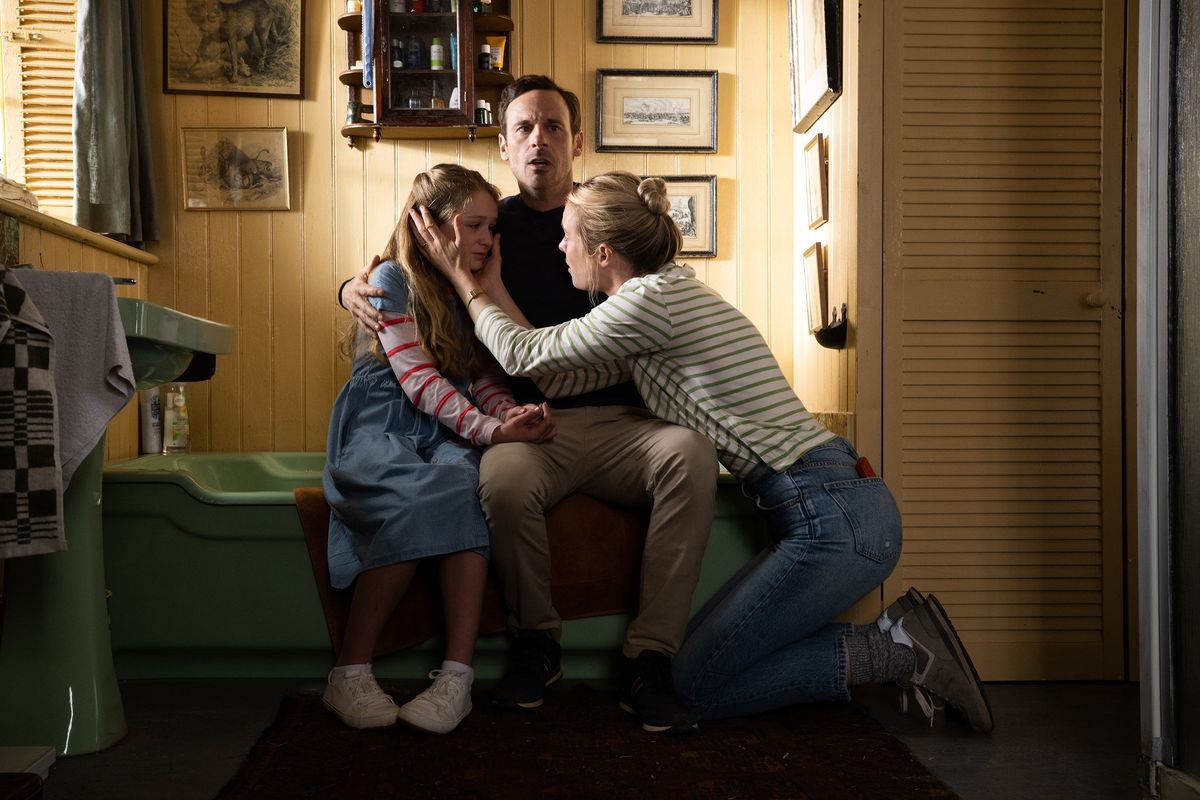Movie review: ‘Speak No Evil’ an effective iteration of Danish horror film

There tends to be a sense of wariness around an American remake of an international film: a worry that the American version will squander the inherent qualities of the original; that the filmmakers and studio might take something singular and turn it into a bigger, shinier blockbuster. That is exactly the case with writer/director James Watkins’ “Speak No Evil” – a remake of a 2022 Danish horror film of the same name by Christian Tafdrup – and yet it works, thanks to a rock-solid, sickeningly horrifying premise dreamed up by Tafdrup and his brother Mads, with whom he wrote his screenplay.
“Speak No Evil” is a horror film “of manners,” so to speak. A couple with a young daughter meet another couple with a son on vacation in Italy and become friendly. The couple with the son invite the other family to stay at their home for a weekend, where the environment becomes increasingly awkward and even dangerous. The question becomes, where does self-preservation prevail over politeness? When does survival supersede social grace?
The original Danish film is suffused with an existential bleakness and a crushing sense of dread. Yet, there are moments throughout where the characters might escape their horrible fate, where you shout at them to keep going, don’t turn around now. There’s a bit of a “Choose Your Own Adventure” quality to the setup where the audience can insert themselves: at what point do you leave? Where is your red line? What would you do here? Because we come to find out that this terrible scenario has happened repeatedly, one can imagine the different ways this might play out with different people, which is exactly Watkins’ take on the remake: with a new set of players, how does this unfold?
In Watkins’ iteration, an American expat family that has just moved to London replaces the Danish family; a working-class English trio from Devon take the place of the Dutch vacation friends who invite them for a visit to their farm in the West Country. The Americans have a sensitive, anxious daughter named Agnes (Alix West Lefler), the English have a withdrawn, mute boy, Ant (Dan Hough), whom they hope will be friends.
American husband Ben (Scoot McNairy) has his own set of issues that lead him to seek out a friendship with Paddy (James McAvoy), a funny, brutish, rough-and-tumble lad married to the sexy, easygoing Ciara (Aisling Franciosi). Ben, who has recently lost the job that brought them abroad, and whose marriage with strident Louise (Mackenzie Davis) is strained, is somewhat aimless and emasculated. Paddy is a confident, manly, back-to-the-land type, and he seems to hold the secret to masculine reinvigoration; the promise of his friendship is as intriguing to Ben as it is off-putting to Louise.
Yet Louise assents to her husband’s desires out of a sense of guilt and a feminine desire to please. She will squash her clanging inner alarm bells that go off every time Paddy offers her a slice of meat (she’s vegetarian), drives erratically, disciplines Ant harshly and consistently makes her uncomfortable. Her sense of empathy for Ciara and Ant overrides her impulse to flee until she can no longer ignore her instincts and her assertive American mama bear comes charging forth.
You don’t cast Davis, who once starred in a “Terminator” film, if that option isn’t on the table. And while the grinning, sinister McAvoy might grace the film’s poster, and McNairy’s Ben is the catalyst for the story’s engine, make no mistake, Davis emerges as the star of “Speak No Evil.” Her small, minute reactions as she’s trying to maintain the sweet wife image are as deft as her more powerful, action-oriented moments.
Watkins offers up a deeply faithful adaptation in the first hour, condensing a few moments here and there to make room for a more extended standoff and showdown in the climax. So yes, this American remake is the bigger, shinier version of the small, menacing Scandinavian film, boasting sweeping aerial photography, larger sets and pyrotechnics. It also more overtly explores themes of abuse cycles, embittered white male entitlement and complex marriage dynamics. The children, who are aged up, have more agency in the story too.
Perhaps for some, this will be an affront to the devastating, almost meaningless terror of the original, a cautionary tale about stepping outside one’s confines that offered no easy answers about its violence other than, “because you let me.” But in the remake, it is fascinating to see how Watkins teases out new themes, cultural nuances and endings with a whole new set of characters placed within this premise. Despite the differences, it is still a thrill to watch it play out in its own way.